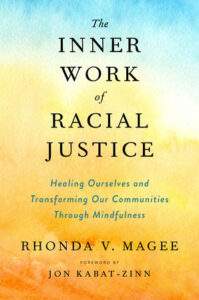Talking about race isn’t easy for anyone—and teaching about race can be a minefield. One of my own most difficult moments teaching about race happened when I encountered intentionally provocative behavior from one of my students, Dan, an Asian-American cis-gendered man.
Dan was in his last semester of law school, and this was his third course with me—it was a course on contemporary issues of race and law.
A major component of the course was a research paper and the students each took turns discussing their thoughts on their projects. When we came to Dan, he said, “I want to do a paper on the Rodney King beating.” His likely “thesis,” he announced, was that the beating King received at the hands of police “was deserved.”
Even as I write this now, I can feel a blip of reactivity. I can see the policemen in that grainy video that we’ve all seen, appearing to let loose with as much force as they could muster on Mr. King, raining strikes with their batons on the head and torso of a man already on the ground beneath them. And I can feel the empathetic pain, sadness, and anger coming up for me as a result.
So, when Dan made this announcement to our small seminar-style class sitting around an oblong table, I could sense the tense silence that fell across the whole room. And I could feel my mouth go dry with fear and a bit of intimidation.
I felt my temperature involuntarily rise, the blood seemingly rushing to my head. “This is what anger feels like,” I knew enough to admit to myself silently. And I certainly felt viscerally and immediately the sense of energy of judgmental thoughts arising in my own mind (“You are wrong!”) and indignation (“How dare you?”). This was what confusion, anger, and dismay all mixed up together felt like. And it was what deep concern and compassion for my other students felt like—several of them were black and brown, and had felt the direct impact of nationwide patterns of overpolicing of black men. Finally, on top of all of this, my own ego was on the line—I’d been tasked with facilitating this conversation and guiding it productively, and this moment certainly wasn’t feeling like success.
Navigating Reactivity Around Race
There are times when the best way to handle strong emotion is to give yourself a time-out, to give yourself space to figure out the best way to address a difficult situation. This felt like one of those times. In the throes of reactivity, my first strategy was to notice my distress and to take steps to find my centered self.
As best I could, I stayed as centered as possible in the full-on experience of reactivity and judgment.
“Dan, I want to remind you that this is a legal research paper and not an opinion paper,” I said, feeling supported by the structure, in this case, of a law school course and its stated objectives. “So as you think through your topic and thesis, be sure to keep that in mind.
“And,” I continued, “we should discuss your thinking about this project, and about this particular topic, one-on-one.”
And so, we did. During the first of several one-on-one conversations with Dan, I invited him to sit down with me and talk this through. We had both enjoyed our interactions over the course of the other two classes he’d taken with me, so in preparation, I did what I could to refocus us both on the positive history between us. After a bit of small talk, I told him I appreciated his interest in this topic. “I am always curious about what draws students into one topic or another,” I said. “What is it that draws you to this particular topic? Has it been an interest of yours for some time?”
In the throes of reactivity, my first strategy was to notice my distress and to take steps to find my centered self.
It didn’t take long for me to uncover a prior, related trauma Dan had experienced. And herein, another lesson: Beneath every aggression or effort to attack is a wounded human being.
“Well . . . yes,” he said. His voice slowed as his gaze turned inward. “Actually, I tried to write a paper about this a long time ago, and . . . it did not go well. In fact, it was the worst experience I’ve had in school. Ever.”
Dan told me that years ago, in a class on multiculturalism—the only other class he’d ever had with a black female professor, in fact—he’d sought to make the same argument about Rodney King. According to Dan, that professor had reacted with what felt to him like fury. Flooded with anger, she had shouted him down for what to him had seemed like an eternity. She’d dismissed his proposal and whatever thought or experience went with it in a way that left him shaking and undone.
Not surprisingly, as a result, he had not written the paper he’d proposed. Instead, he had withdrawn into his own feelings of anger and shame. From that day on, he held something against this teacher, this particular black woman. And, as he came eventually, slowly, to see, maybe all black women.
Sitting with Compassion
Years of sitting and breathing and noticing what arose allowed me to stay present to my own racing heart and fluttering stomach without investing it with a story of what had to be done next. Somehow, despite my original impulse to run away, I remained right there with him, my eyes on him with openness. I maintained awareness of my own breathing, in and out, and feeling the ground beneath my feet and the chair supporting me at my core. I remained grounded, even as I felt my own emotions arise and subside as the words tumbled forth from this student sitting across from me. And I kept coming back, again and again, to the intention of listening to Dan—my student. And listening to him, I began to actually put myself in his shoes. Empathy and compassion naturally opened my heart.

Here again, my meditation practice helped. Years of simple mindfulness meditation practice—which helps you recognize more readily when you need to take a moment, as well as the STOP practice—which helps you develop the emotional intelligence and psychological flexibility required for greater mastery over the challenging moments when you engage in difficult conversations.
As I listened to Dan, I intentionally sought not only to hear his voice and story, but to listen as deeply as I could to what he wanted me to hear. It wasn’t easy. When my own reactions arose, I noticed them. Relying on my practice, I sensed the ground beneath my feet. I came back to the sense of my role as professor and guide. Sitting with him, I returned my focus to his words and the sense of the feelings beneath them.
I listened to him in a way intended to help him feel safe enough to share deeply about his experience. Knowing that he had truly suffered over this, I wanted to alleviate his suffering by truly listening to him—in a way that would enable him to feel a sense of my caring for him, while at the same time staying in touch with my own feelings and guarding against any emotional reactivity that could get in the way.
As I listened to Dan, I intentionally sought not only to hear his voice and story, but to listen as deeply as I could to what he wanted me to hear. It wasn’t easy.
I realized that I wanted him to sense that my concern for him would not be disrupted by what he had to say. Doing so required more than intent or will; it required the support of a nervous system whose capacity for just this had been built up through the regular practice of mindfulness.
So, with awareness of what was happening, but as little judgment about it as I could muster, I could guard against my own reactivity enough to actually hear Dan’s words.
I could see and feel the complex set of emotions running through him as a result of what he had experienced in that classroom so long ago: anger, fear, confusion, and the most toxic feeling of all—humiliation. I could see the suffering he still carried with him.
Sitting with Dan, with a desire for him to experience relief from his suffering, was not easy for me. The Rodney King video had shaken me to my core. Watching that instance of police brutality left me fearful of police for years and years to come. Despite my reactivity, however, I understood that my role as teacher in that setting was not so much about me. It was about creating a space in which Dan’s truth could be uncovered, unpacked, and given a chance to be met with other truths that would allow learning, healing, and potential transformation to take place.
Walking the Walk of Mindful Racial Justice
As Dan and I took the time to have a series of difficult talks together, outside the spotlight and group dynamics of the classroom setting, I learned that in that very first moment when I decided to pause, to respond rather than to react, and then to take a time-out before meeting with him again, I’d not only reconnected with my own center but had also taken the first steps in helping Dan find healing. And by the end of the semester, he’d come to realize it too.
In the final week of the class, after giving a presentation in which he sought to make an argument that hewed closely to his original premise, Dan told the class, “I realize I have been holding on to some of my own pain around this incident. And it’s something I have to let go.” He wasn’t necessarily a completely changed man. But he could see a glimpse of a way forward that no longer involved painful, unnecessarily provocative confrontations with others whose looks just happened to remind him of his earlier trauma.
So much of what we know as reactivity begins as an emotional charge in response to what we see, hear, read, think about, and otherwise experience in life. That charge leads us to act in ways that may appear to be fully rational, but on reflection, often are not rational at all.
As I think back on my experience with Dan, I realize that dealing with this very triggering moment and relying on my own mindfulness practice over the course of that entire semester many years ago is what solidified my decision to bring mindfulness and compassion practices directly to bear on teaching and facilitating conversations about race and law. I realize that what had been my own, personal strategy for dealing with difficulty around these issues—compassion-based mindfulness practices—needed to come out of the closet and into the center of my work.
Now, in my work as a law professor at the University of San Francisco, and as a facilitator of restorative, trauma-sensitive MBSR, I can see the power of working through race issues with the support of awareness and compassion practices. Each time I sit with others in their pain and vulnerability, listening with compassion, I’m reminded of something my grandmother (GranNan) used to tell me: We are all one family who have forgotten who we are. Through mindfulness practices, we can begin to infuse our experience of ourselves in culture, community, and context with a sense of the valid, often painful experiences of others.
Reprinted with permission from The Inner Work of Racial Justice by Rhonda V. Magee, published by TarcherPerigee, an imprint of Penguin Publishing Group, a division of Penguin Random House, LLC. Copyright © 2019 by Rhonda Varette Magee.
Read More
The Gift of Being Alive: A Q&A with Rhonda Magee
Rhonda Magee on being with vulnerability, getting angry, and knowing joy and healing are possible.
Read More
The S.T.O.P. Practice: Creating Space Around Automatic Reactions
Rhonda Magee takes us through this simple portable mindfulness practice she uses to find calm when difficult moments arise.
Read More






